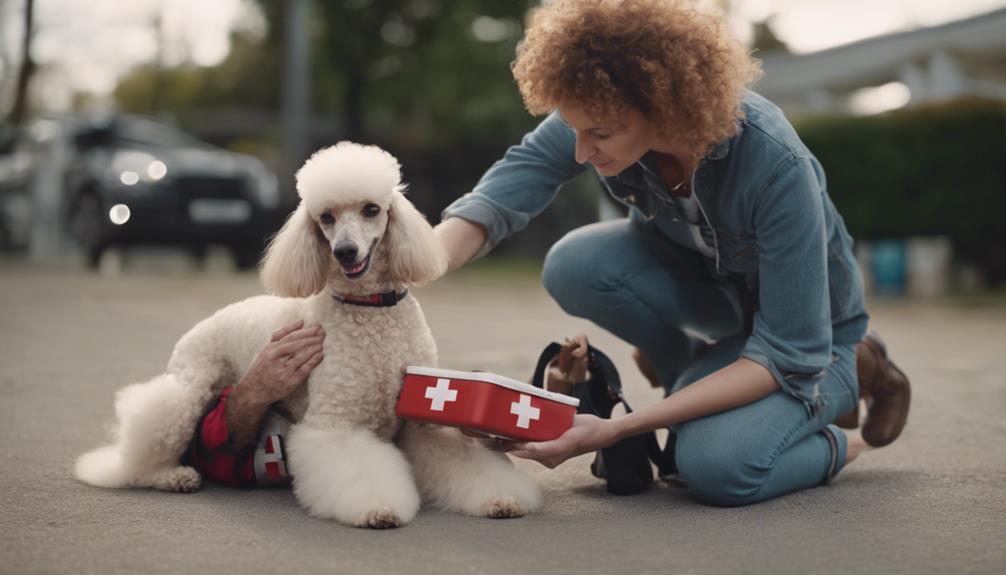Imagine you're enjoying a peaceful stroll with your elegant poodle when suddenly, a mishap strikes. In those critical moments, knowing how to administer first aid could make all the difference between panic and resolution. From minor cuts to more severe incidents, being equipped with the right knowledge can safeguard your poodle's well-being. So, are you prepared to handle unexpected emergencies and ensure your furry friend receives the care they need?
Key Takeaways
- Recognize signs of distress promptly, including panting and weakness.
- Have essential first aid kit items like styptic powder and a rectal thermometer.
- Learn and apply the Heimlich maneuver for choking emergencies.
- Prioritize wound care with proper cleaning and monitoring for infections.
Recognizing Poodle Emergency Situations
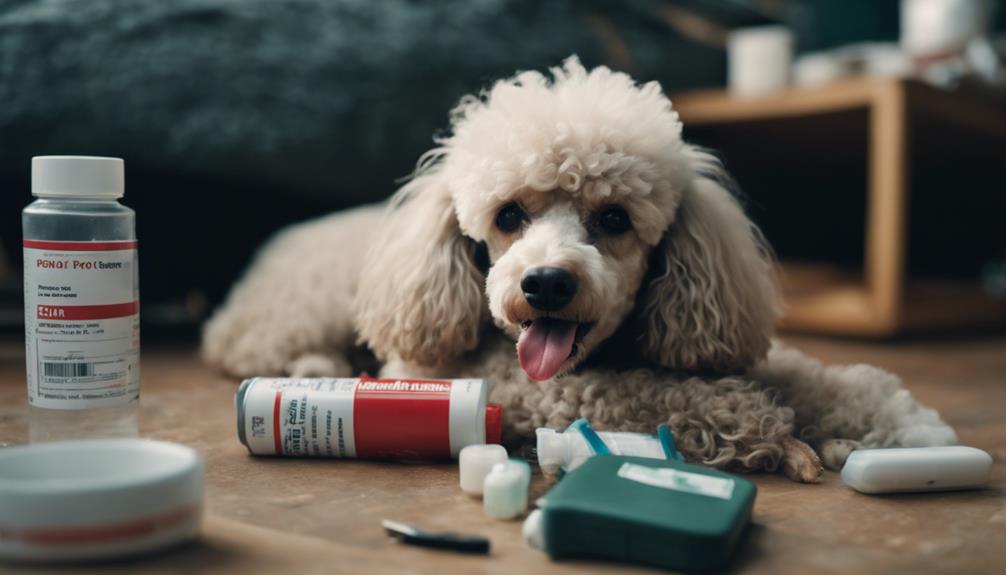
When owning a Poodle, it is crucial to be able to recognize emergency situations that may arise. Poodles, with their dense coat and sensitive skin, are prone to heatstroke. Signs of distress like excessive panting, drooling, and weakness should alert you to potential emergencies. Additionally, due to their small size and curious nature, Poodles are at risk of choking on small objects or food, necessitating quick action on your part. It's also important to watch for symptoms of poisoning in your Poodle, as they may ingest toxic substances like chocolate, grapes, or certain plants, which can have serious consequences. If your Poodle has a history of seizures, careful monitoring is essential, and immediate veterinary attention should be sought during seizure emergencies. Being aware of these potential emergency situations and the signs of distress in your Poodle can help you act swiftly and decisively to ensure your pet's well-being.
Building a Poodle First Aid Kit
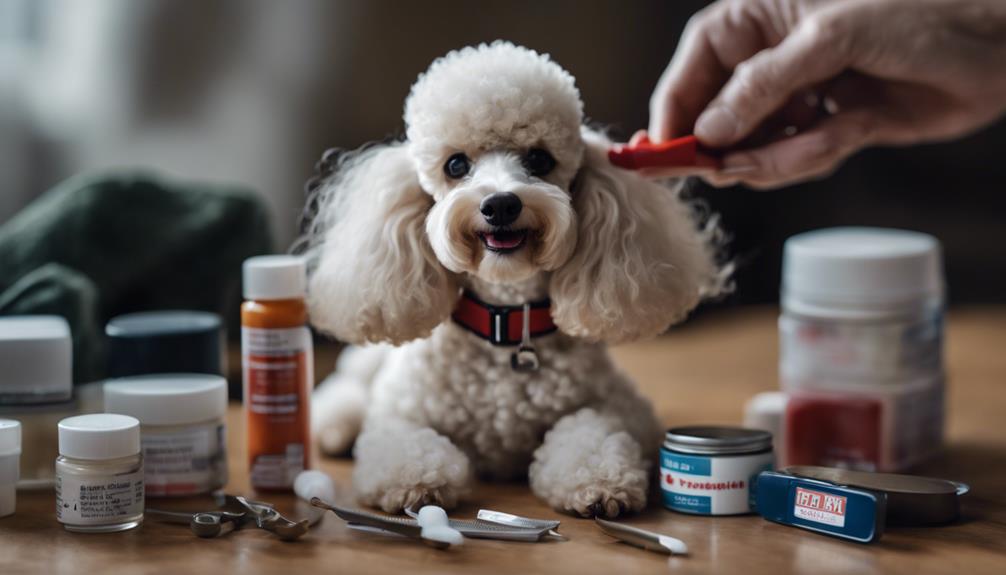
To ensure the safety and well-being of your Poodle, assembling a comprehensive first aid kit is essential. Your pet's well-being is a top priority, and having the right supplies readily available can make a significant difference in an emergency. Here are some essential items to include in your Poodle first aid kit:
- Styptic powder: for nail bleeding emergencies.
- Ear cleaning solution: to maintain ear hygiene.
- Paw balm: for soothing and protecting your Poodle's paws.
- Rectal thermometer: to monitor your pet's temperature in case of illness.
- Tick removal tool: for safely removing ticks from your Poodle's skin.
Remember to also pack your Poodle's medical records, emergency contact numbers, and a list of allergies in the first aid kit. Additionally, include antihistamine for allergic reactions, a muzzle for safety during treatments, and a blanket for comfort in stressful situations. Ensure your Poodle first aid kit is easily accessible at home, in the car, or during outdoor activities with your beloved pet.
Immediate Steps for Poodle Emergencies
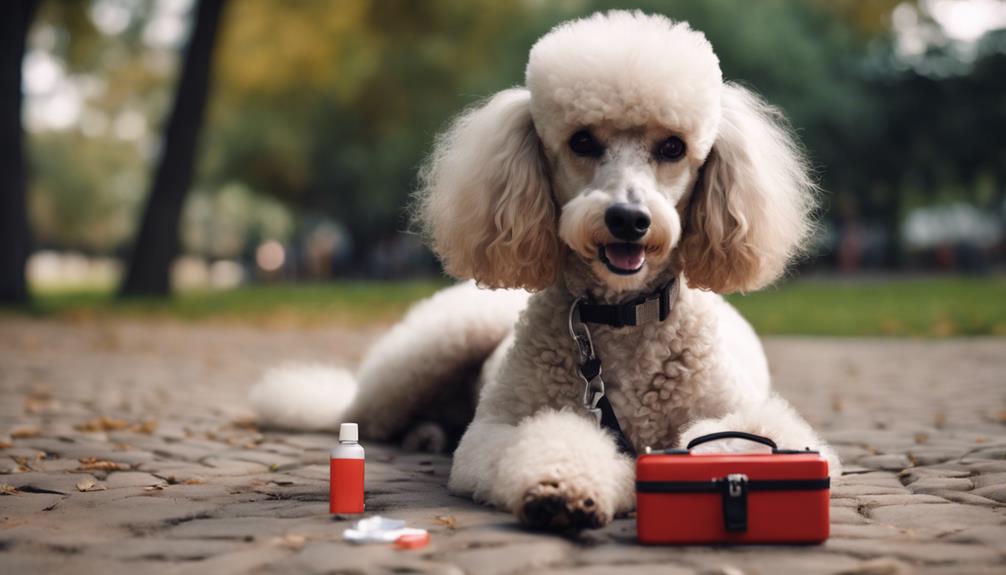
If your Poodle is choking, it's crucial to act quickly by performing a modified Heimlich maneuver and seeking immediate veterinary assistance. Recognizing signs of distress and knowing how to respond can make a significant difference in emergencies. Stay prepared and informed to handle choking hazards and other critical situations effectively.
Choking Hazards in Poodles
Choking hazards in Poodles demand immediate attention and swift action from owners to ensure their pet's safety. Here are some crucial steps to take in a choking emergency with your Poodle:
- Stay calm to assess the situation quickly.
- Attempt to remove the object causing the choking hazard gently.
- Learn the Heimlich maneuver for Poodles and apply it if necessary.
- Contact your veterinarian promptly for further guidance.
- Prevent future emergencies by keeping small toys, bones, and household items out of reach.
Taking these steps can help you be prepared and respond effectively in a choking emergency with your Poodle.
Recognizing Signs of Distress
During an emergency with your Poodle, swiftly recognize signs of distress to ensure prompt intervention and care for your beloved pet. Look for indicators such as lethargy, difficulty breathing, seizures, or a rapid heart rate. Immediate steps in a Poodle emergency include staying calm, assessing the situation, and calling for help. It is crucial to act quickly and provide first aid to your Poodle. Check your pet's responsiveness, inspect for injuries, and assess their breathing and heart rate. If you are concerned about your Poodle's condition, consult with a veterinarian promptly. Being vigilant in recognizing signs of distress can help you respond effectively and ensure the well-being of your furry companion.
Handling Poodle Wound Care
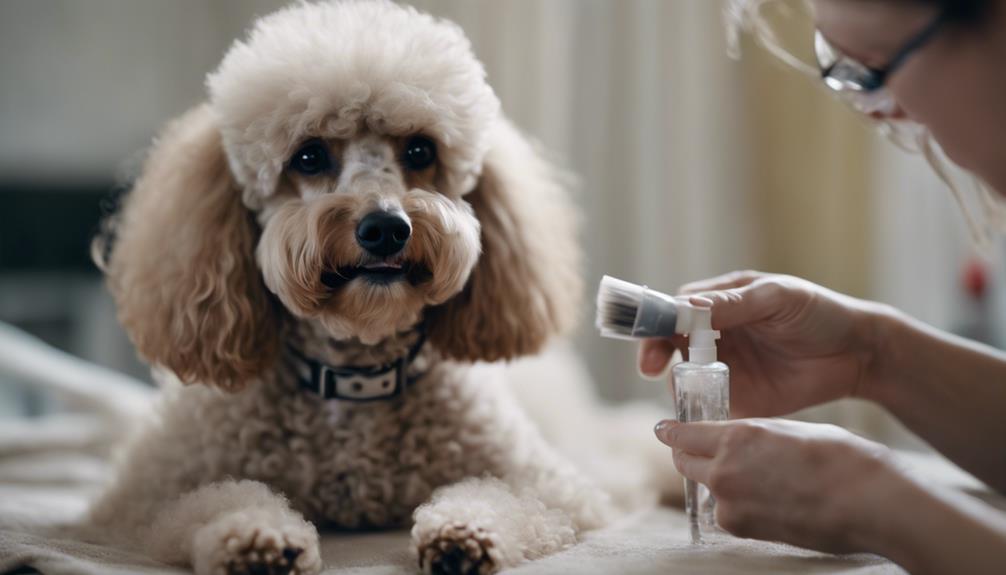
When tending to your poodle's wounds, start by cleaning them with mild soap and water to prevent infection. Here are some essential tips for handling poodle wound care:
- Use a sterile gauze pad to gently apply pressure on bleeding wounds.
- Avoid using hydrogen peroxide on poodle wounds as it can delay healing.
- Monitor poodle wounds closely for signs of swelling, redness, or discharge.
- Seek a veterinarian consultation for deep or severe wounds that may require professional care.
Proper wound care is crucial for your poodle's health and well-being. By following these guidelines, you can help prevent infections and promote faster healing. Remember to keep a close eye on the wound's progress and consult a vet if you notice any concerning changes. Your poodle's comfort and recovery are a top priority, so handling their wound care with diligence and care is essential.
Dealing With Poodle Fractures
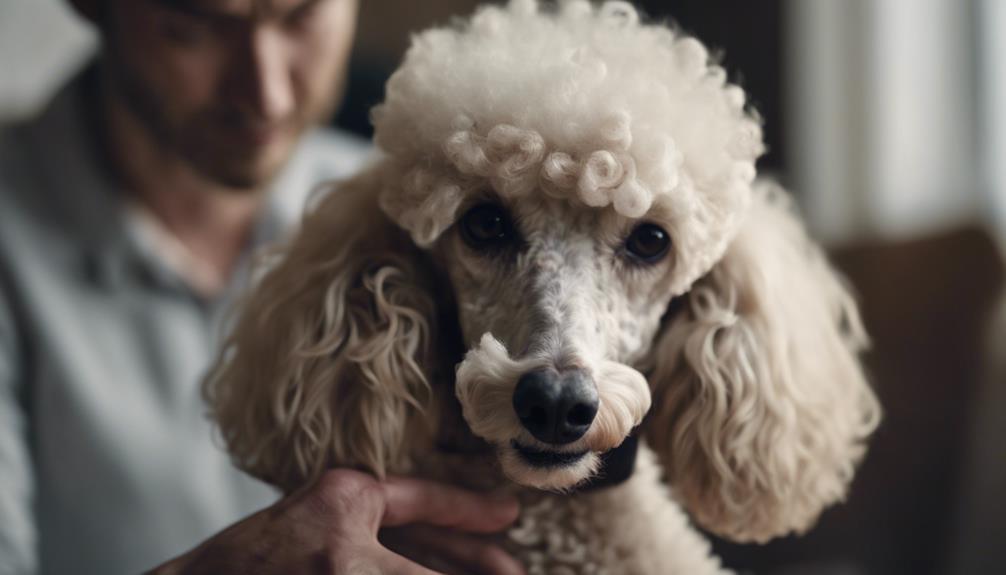
In managing Poodle fractures, prompt veterinary evaluation is essential to determine the appropriate treatment for the injury. Poodles, known for their active nature, are prone to fractures, with the legs being common sites, especially the femur or tibia. If your Poodle shows symptoms like limping, swelling, pain, or reluctance to bear weight on a limb, suspect a fracture and seek immediate veterinary attention. Effective treatment for Poodle fractures typically involves X-rays to assess the extent of the injury. Depending on the severity and location of the fracture, treatment may include splinting, casting, or even surgical intervention. Remember, early intervention is key to ensuring your Poodle's full recovery and preventing further complications. So, if you suspect a fracture in your Poodle, don't delay in getting the necessary veterinary care to address the issue promptly and appropriately.
Treating Poodle Burns and Scalds
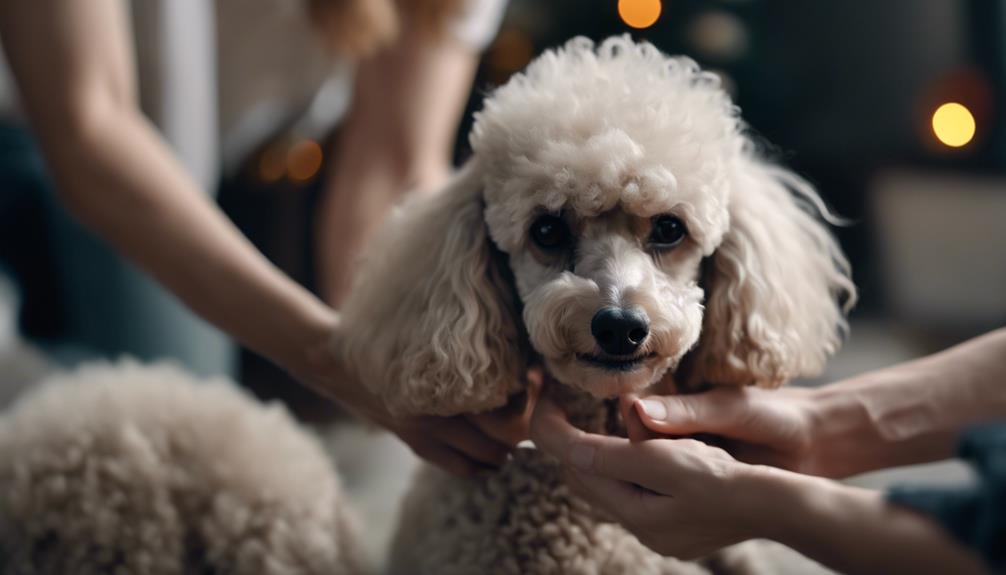
If your Poodle sustains a burn, remember to immediately cool the affected area with gentle cool water. Ensure to avoid using ointments or butter on the burn as they can make the situation worse. For scalds or severe burns, seeking prompt veterinary care is crucial to ensure your Poodle's well-being.
Immediate Cooling for Burns
To effectively treat burns and scalds on your Poodle, begin by using cool water or a cold, wet cloth to immediately cool the affected area. Remember not to use ointments or butter as they can worsen the injury by trapping heat. Seeking veterinary advice is crucial for chemical burns to prevent further damage. Avoid using ice or ice-cold water directly on the burn to prevent additional harm. Prompt cooling of burns can help alleviate pain and reduce the severity of the injury. Here are some key points to consider:
- Use cool water or a cold, wet cloth to cool the burned area.
- Avoid ointments or butter on the burn.
- Seek veterinary advice for chemical burns.
- Do not use ice or ice-cold water directly on the burn.
- Prompt cooling can help reduce pain and severity of the injury.
Seek Vet for Scalds
For Poodle owners dealing with burns and scalds, seeking veterinary assistance promptly is essential for proper evaluation and treatment. Burns and scalds can be particularly challenging for Poodles due to their sensitive skin. It's crucial to have a pet first aid kit handy and to know how to respond in such situations. When your Poodle experiences a burn or scald from hot surfaces or liquids, immediate veterinary care is necessary. Avoid using cold water or ice directly on the affected area as it can cause further damage. Remember to handle your Poodle with care around potential hazards to prevent burns and scalds. Seeking veterinary care promptly will ensure the best outcome for your beloved pet.
Poodle Choking and Airway Blockages
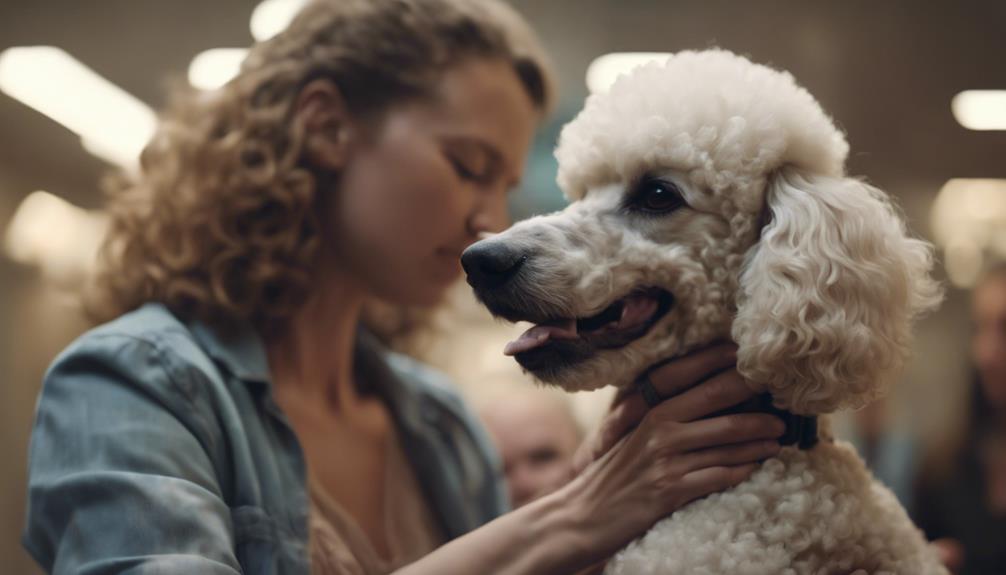
Poodle owners must remain vigilant to prevent choking incidents, especially given the breed's propensity for exploring with their mouths and their small size, which increases the risk of airway blockages. Here are some important points to consider:
- Monitor Playtime: Keep a close eye on your Poodle while playing to prevent them from picking up small objects that could be potential choking hazards.
- Be Careful with Treats: Avoid giving your Poodle small treats or bones that they could swallow whole.
- Know the Symptoms: Familiarize yourself with the signs of airway blockages in Poodles, such as coughing, gagging, difficulty breathing, pawing at the mouth, and signs of distress.
- Learn the Heimlich Maneuver: Knowing how to perform the Heimlich maneuver on your Poodle can be crucial in case of an emergency where they are choking.
- Immediate Action: If you suspect your Poodle is choking, act quickly to clear their airway and seek veterinary assistance if needed.
Preventing Poodle Heatstroke
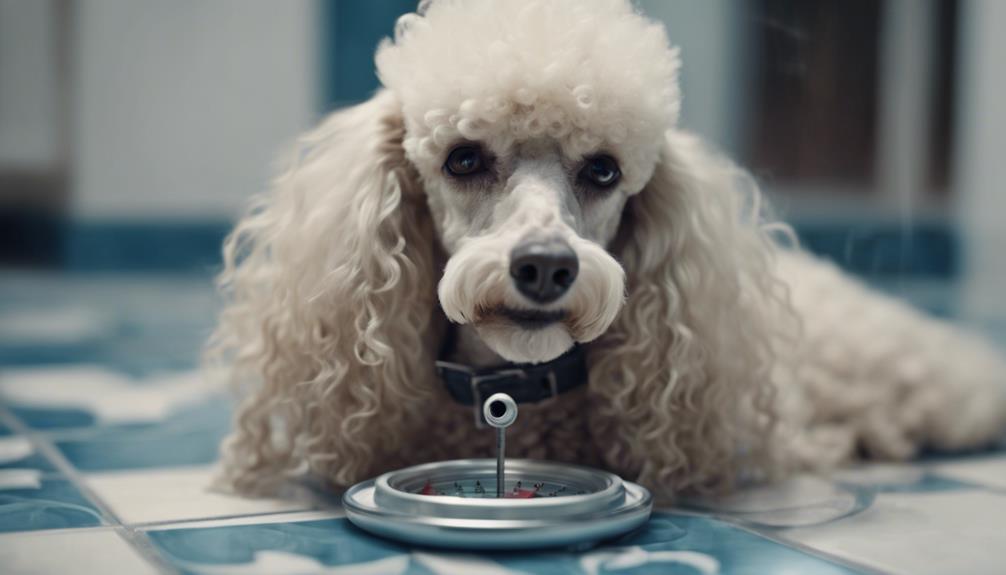
Ensure your Poodle has access to shady areas and plenty of water to prevent heatstroke. Keep an eye on their hydration levels and avoid strenuous activities in hot weather. Remember, never leave your Poodle in a parked car, and seek immediate veterinary care if you notice signs of heatstroke.
Shade for Poodles
To protect your Poodle from heatstroke, it is crucial to provide ample shade during hot weather. Here are some tips to help prevent heat-related illnesses:
- Create Shade: Set up a shaded area with good ventilation to help your Poodle stay cool.
- Utilize Cooling Mat: Use a cooling mat to provide a comfortable and cool surface for your Poodle to rest on.
- Avoid Direct Sunlight: Keep your Poodle out of direct sunlight for prolonged periods to reduce the risk of heatstroke.
- Monitor Signs of Heat Exhaustion: Watch out for excessive panting, drooling, and weakness as these could indicate heat exhaustion.
- Stay Vigilant: Be attentive to your Poodle's behavior in hot weather to ensure they are safe and comfortable.
Hydration Importance
To prevent heatstroke in your Poodle, maintaining proper hydration levels is paramount, especially during warm weather or when engaging in strenuous activities. Dehydration can quickly lead to heatstroke in Poodles due to their thick coats and active behavior. Always provide access to fresh water and monitor for signs of dehydration like excessive panting, lethargy, or dry gums. Offering regular water breaks and creating shaded areas for your Poodle to rest are essential practices to prevent heat-related issues. Remember, proactive hydration management is key to ensuring your Poodle's well-being during hot days or intense play sessions.
| Importance of Hydration for Poodles | |
|---|---|
| Prevents Heatstroke | Ensures Optimal Health |
| Vital During Warm Weather | Aids in Temperature Regulation |
| Helps Avoid Dehydration | Facilitates Physical Activities |
| Early Intervention for Signs of Dehydration | Promotes Overall Well-being |
| Provides Essential Water Intake | Supports Proper Body Functions |
Identifying Poodle Poisoning
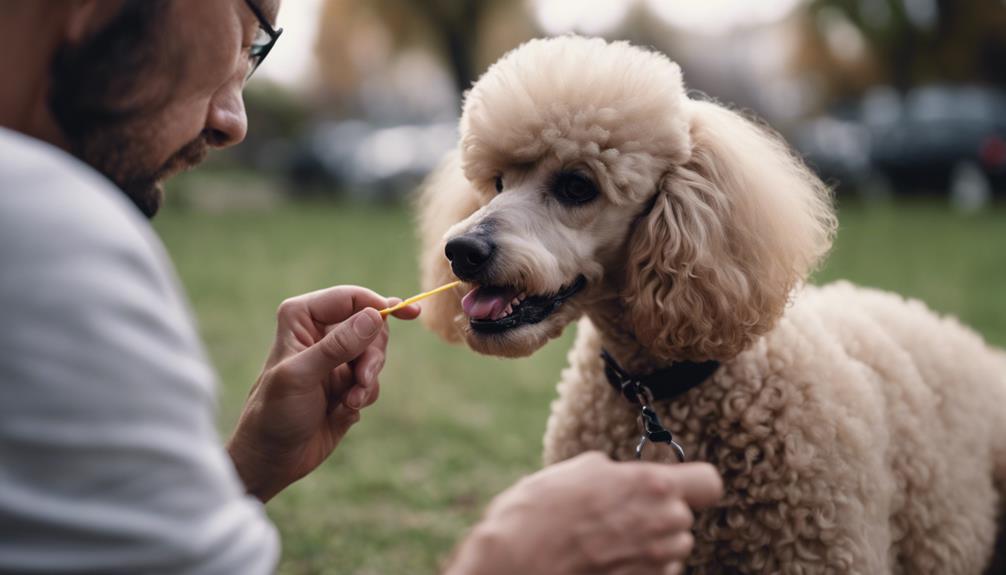
If you suspect your Poodle has ingested a toxic substance, promptly observe for symptoms of poisoning. Poodles are vulnerable to poisoning from common household items like chocolate, grapes, xylitol, and certain plants. Symptoms of poisoning in Poodles may manifest as vomiting, diarrhea, lethargy, drooling, seizures, and difficulty breathing. To effectively identify poisoning in your Poodle, keep an eye out for these signs:
- Vomiting
- Diarrhea
- Lethargy
- Drooling
- Seizures
Immediate veterinary care is crucial if you suspect your Poodle has consumed a toxic substance. Remember to keep all potential poisons out of reach of your Poodle to prevent accidental ingestion. It is essential to familiarize yourself with common poisons and toxic plants to safeguard your Poodle's health and well-being. Swift action and awareness are key in protecting your furry companion from poisoning incidents.
Poodle First Aid for Traffic Accidents
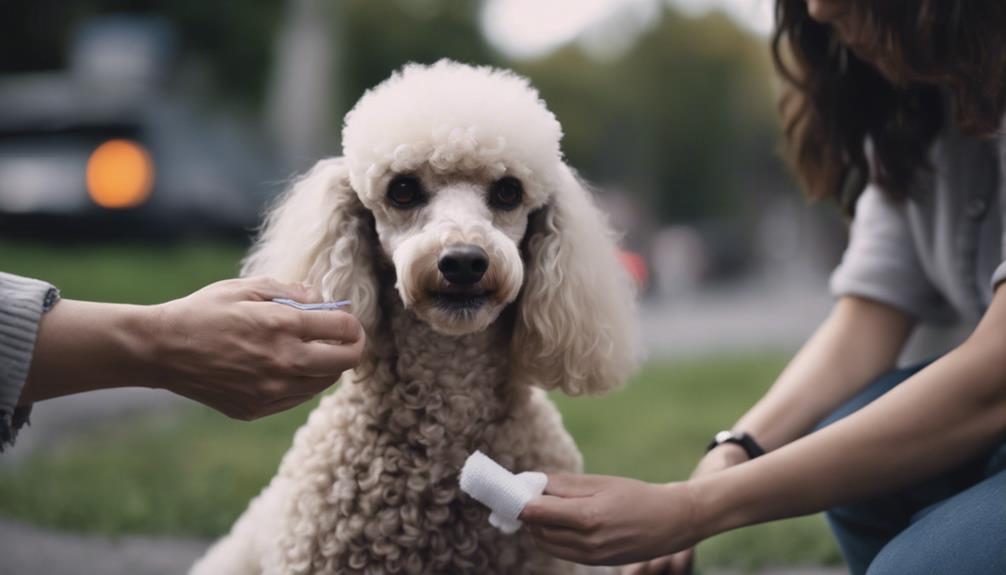
If your Poodle is involved in a traffic accident, the first steps are crucial. Secure them on a flat board to prevent further injury, avoid chest pressure, and tilt their head if a head injury is suspected. Remember to cover your Poodle with a blanket to help prevent shock and ensure they receive immediate veterinary care.
Immediate Care Steps
After a traffic accident involving your Poodle, the first step is to move them to a safe area to prevent further injury. Remember these immediate care steps:
- Check your Poodle for any visible injuries or signs of distress.
- Secure them on a flat board to immobilize and avoid worsening injuries.
- Avoid putting pressure on their chest; tilt their head slightly if there's a suspected head injury.
- Cover your Poodle with a blanket to maintain body temperature and prevent shock.
- Stay calm and reassure your dog to keep them as relaxed as possible during this critical time.
These steps are crucial in providing initial care for your Poodle after a traffic accident.
Contact Vet Promptly
Following a traffic accident involving your Poodle, the next crucial step is to promptly contact your veterinarian for immediate assistance and guidance. Quick communication with your vet is vital in situations like these. Inform them of the accident details, including any injuries or signs of distress your Poodle may have. This prompt communication will aid the vet in assessing the situation accurately. Seeking professional veterinary care without delay after a traffic accident can significantly impact your Poodle's recovery and well-being. Remember, the sooner you reach out to the vet, the sooner your furry companion can receive the necessary care and attention. Your swift action can help prevent further complications and ensure the best possible outcome for your Poodle.
Monitor for Shock
To effectively monitor for shock in your Poodle after a traffic accident, observe for signs such as pale gums, rapid breathing, and a weak pulse. Remember to also watch out for other indicators like cold extremities and a glazed expression. Here are some essential tips to help you monitor for shock in your Poodle after a traffic accident:
- Check for pale gums
- Monitor breathing rate
- Assess pulse strength
- Feel for cold extremities
- Watch for a glazed expression
If you notice any of these signs, keep your Poodle warm and calm, and seek immediate veterinary attention. Quick assessment and intervention are crucial as shock can be life-threatening for Poodles involved in traffic accidents.
Performing CPR on Poodles
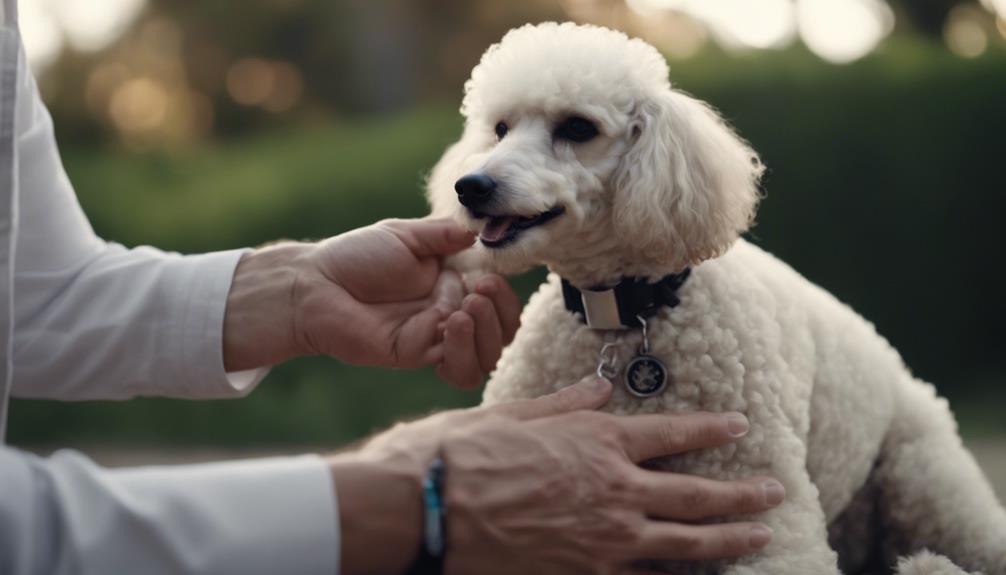
In emergencies, performing CPR on your Poodle is crucial due to their susceptibility to respiratory issues caused by their brachycephalic anatomy. To start CPR, check for responsiveness, lay your Poodle on a flat surface, and begin with chest compressions and rescue breaths. The recommended ratio for chest compressions to rescue breaths in Poodles is 30 compressions to 2 breaths. When administering chest compressions, ensure proper hand placement on the Poodle's chest to effectively pump the heart. Continue performing CPR on your Poodle until they regain consciousness or until veterinary assistance is available. Remember, quick and correct CPR can be life-saving for your furry companion. Being prepared to perform CPR in an emergency can make a significant difference in your Poodle's chances of recovery. Practice these steps to be ready to act promptly if the need arises.
Poodle Rescue Breathing Techniques
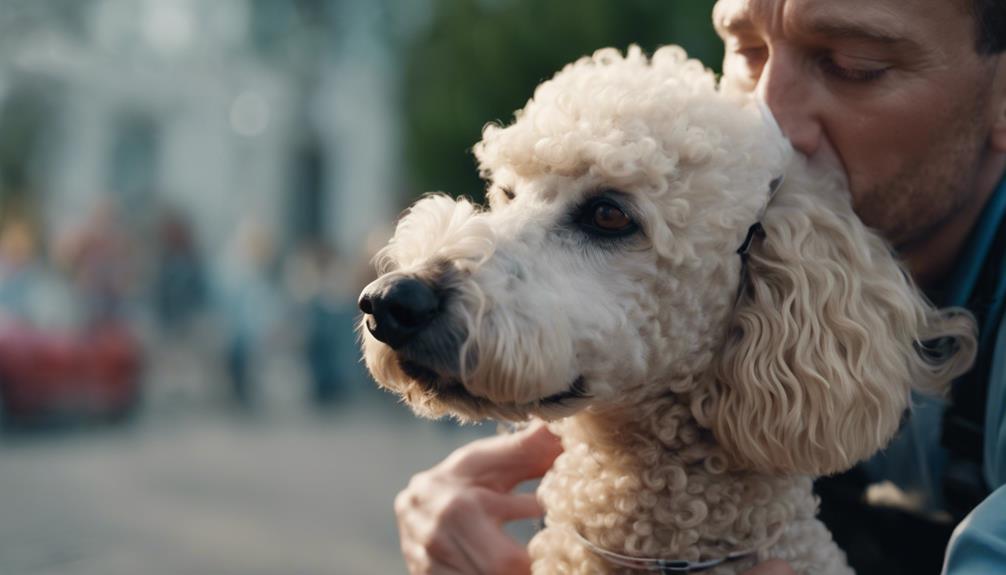
For effective response to respiratory emergencies in Poodles, mastering proper rescue breathing techniques is essential. Poodles are susceptible to respiratory issues, emphasizing the importance of knowing how to perform rescue breathing correctly in case of an emergency. Here are some key tips to help you administer rescue breathing to your Poodle:
- Use rescue breathing to provide oxygen to a distressed Poodle by blowing air into their nostrils.
- Close your Poodle's mouth and seal your lips around their nose before gently blowing air.
- Monitor your Poodle's chest movements closely to ensure that the air you breathe in is reaching their lungs.
- Adjust the pace of your rescue breathing to maintain a steady rhythm and maximize the effectiveness of the oxygen delivery.
- Prioritize learning and practicing proper rescue breathing techniques to be well-prepared for any respiratory emergency your Poodle may face.
Training in Poodle First Aid
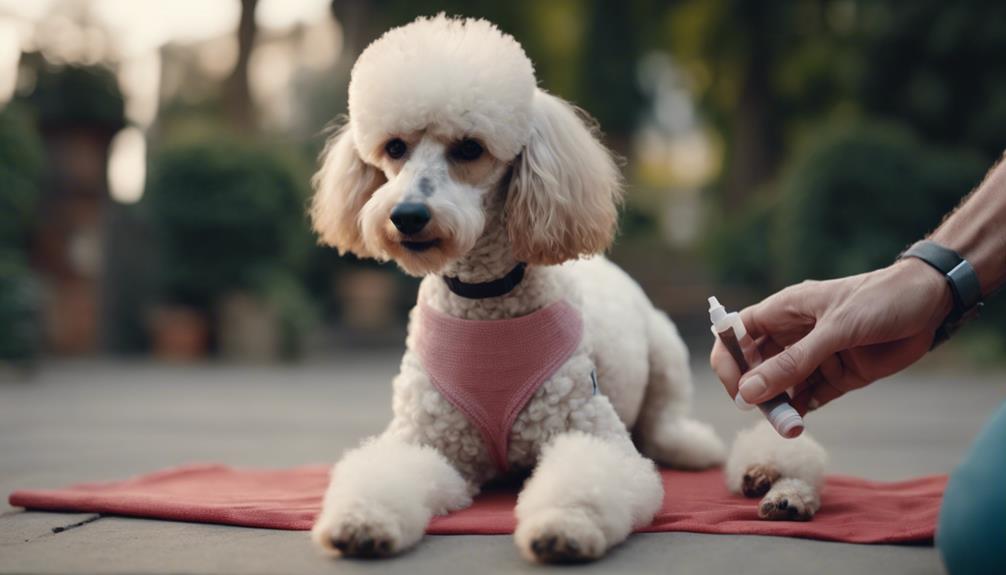
Mastering Poodle first aid involves understanding breed-specific health concerns and common medical emergencies, crucial for effectively caring for your furry companion. Poodles have unique health considerations that owners must be aware of to provide the best care in times of need. Below is a table highlighting key aspects of training in Poodle first aid:
| Poodle First Aid | Description |
|---|---|
| Breed-specific concerns | Learn about conditions like hip dysplasia and sebaceous adenitis that are common in Poodles. |
| Common emergencies | Understand how to handle issues such as bloat, ear infections, and allergic reactions promptly. |
| Grooming-related injuries | Be prepared to address cuts, scrapes, or burns that may occur during grooming sessions. |
| Signs of distress | Recognize symptoms like excessive panting, restlessness, or pale gums that indicate your Poodle needs help. |
| Hands-on training | Practice simulated emergency situations to enhance your preparedness and response skills. |
Pet First Aid Reading Recommendations
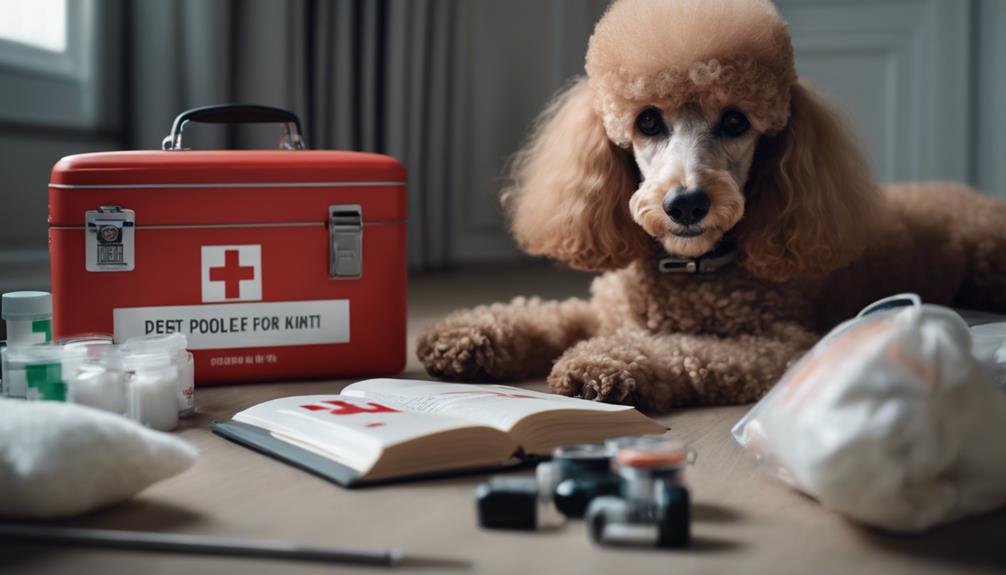
Consider exploring the following recommended reading materials on pet first aid to enhance your knowledge and preparedness in caring for your beloved pets:
- *Pet First Aid for Dummies*: This comprehensive guide covers essential first aid techniques for pet owners.
- *The First Aid Companion for Dogs & Cats*: Provides in-depth information on handling emergencies and caring for pets in distress.
- *Pet Emergency Pocket Guide*: Offers quick reference tips for common pet emergencies and first aid procedures.
- *The Veterinarians' Guide to Natural Remedies for Dogs*: Includes holistic approaches to pet health and first aid care.
- *Dog First Aid: A Field Guide*: A practical manual tailored for dog owners facing emergency situations.
These resources can empower you to respond effectively in emergency situations, providing temporary care for your pet until you can reach a vet as soon as possible. Understanding basic first aid techniques is crucial for all pet owners to ensure the well-being of their furry companions.
Poodle-Safe First Aid Practices
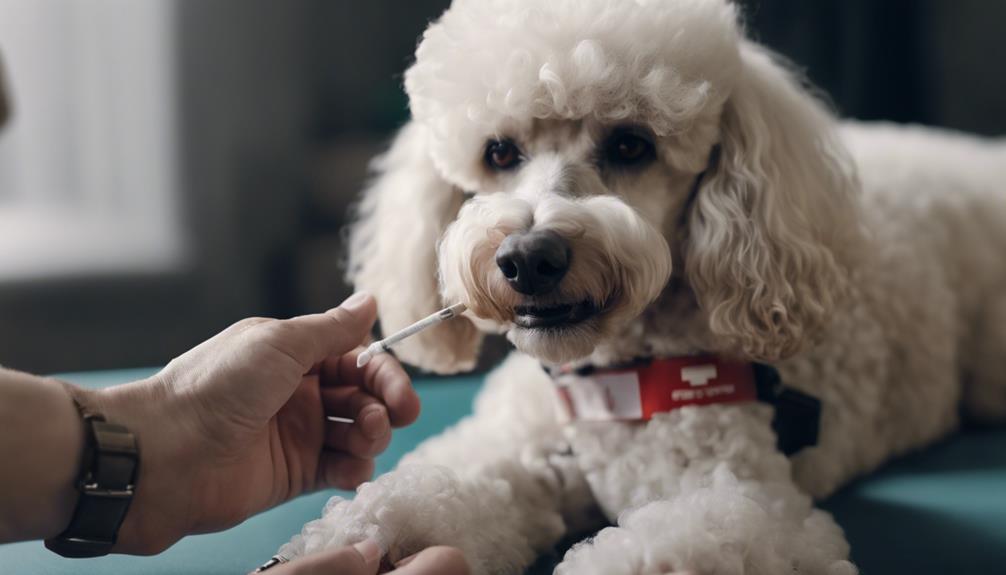
To ensure the well-being of your Poodle in emergency situations, it is essential to implement safe and effective first aid practices. Poodles are prone to ear infections, necessitating regular ear checks and cleaning to prevent complications. Since they have a tendency to develop skin allergies, stay vigilant for any skin irritations or rashes that may arise. Keeping your Poodle's coat well-groomed and free of mats is crucial to prevent skin problems and ensure their comfort.
Watch out for symptoms of bloat in Poodles, such as restlessness, pacing, and a distended abdomen. If you notice these signs, seek immediate veterinary assistance as bloat can be life-threatening. Moreover, Poodles can be sensitive to certain medications, so always consult a vet before administering any treatments or first aid to avoid adverse reactions.
Frequently Asked Questions
What Position Helps a Dog Breathe Better?
To help a dog breathe better, try gently elevating their front end or positioning them in a sitting stance with a slightly raised chest. Keep their airway clear by tilting the head forward. Avoid pressure on the chest or neck for optimal breathing.
What First Aid Should Given to a Dog?
In case of emergencies, remember to apply pressure to control bleeding, clean wounds with antiseptic solutions, and provide CPR or rescue breathing if needed. Keep your dog calm, have a well-equipped first aid kit, and contact emergency vet services promptly.
What Are the 7 Basic Needs of a Dog?
To ensure your dog's well-being, prioritize nutrition, exercise, grooming, socialization, and training. Provide a balanced diet with essential nutrients, engage in regular exercise, maintain grooming habits, foster socialization skills, and employ effective training methods for a happy and healthy pet.
How Do You Clear a Dog's Airway?
When a dog chokes, remember the Heimlich maneuver. Carefully check for choking hazards in the airway. Use proper technique to clear the obstruction. Train for emergency response and stay aware of pet safety.
Conclusion
In conclusion, being prepared with first aid knowledge and supplies can make a huge difference in ensuring the health and safety of your poodle in times of emergency. For example, imagine your poodle accidentally ingests a toxic substance and you are able to quickly administer first aid before rushing them to the vet, potentially saving their life. By taking proactive steps and staying informed, you can be a responsible and prepared poodle owner.
